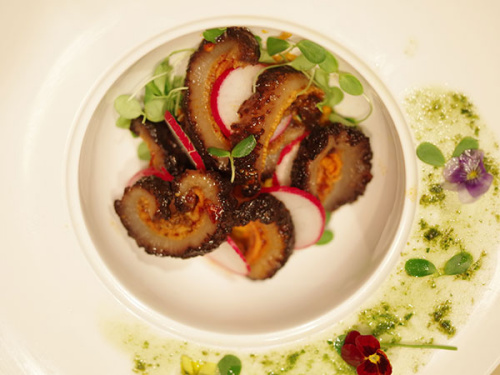
(Photo/China Daily)
Chinese want them - and can't get enough.
Canadians have got plenty - and don't want them.
The situation with sea cucumbers, long considered a delicacy in China, is adding up to a true win-win opportunity.
Sea cucumbers, valued for their traditional Chinese medicinal properties, are widely farmed in China's coastal areas to satisfy the great market demand, and a cluster of 500 gram upscale dried Chinese sea cucumbers can sell for up to 10,000 yuan ($1,612).
Now wild Canadian sea cucumbers, captured in the North Atlantic Ocean off the coast of Nova Scotia province, are also finding their way onto Chinese food tables, as most Canadian people don't consider the creature edible.
Last week at a media conference in Beijing, a deal was announced between Canadian seafood processing giant United Trans and Beijing Pharma, a capital-based pharmaceutical that owns the government-certified online drugs and healthcare products shopping platform in China, Yaofang.com.
Under the agreement, Canadian sea cucumbers will be allowed entry into China as a health product, according to a statement by Beijing Pharma.
"We are very excited about the sea cucumbers getting into the Chinese market," says Keith Colwell, minister of agriculture and minister of fisheries and aquaculture of Nova Scotia province. "We have crystal-clear water in North Atlantic Ocean. The sea cucumbers are wild. The environment they grow in is totally natural."
Although he couldn't cite the exact numbers, Colwell says that the export volume of Canadian sea cucumbers into China has increased exponentially.
At least 30 percent of last year's catch was imported into China.
The wild variety of sea cucumber is usually larger and rounder than a Chinese farmed creature. They also have little thorns on the cylindrical body's skin and have a ring of tentacles around the mouth.
Gao Songwen, owner of United Trans, says that Canadian sea cucumbers have greater nutritional and therapeutic value as compared to the ones farmed in China, because they are richer in nutrients, including holothurin compounds, minerals and protein, and are free of contaminants because they grow slowly in deep, cold waters.
The chilly waters also force Canadian sea cucumbers to swim a lot, resulting in more muscle texture in the body, Gao says.
Founded in 1986, the company started to export sea cucumbers in 2013 to Asian countries and regions where Chinese live, such as Malaysia. The new agreement marks its first official entry into the Chinese market, where it will export dried sea cucumbers (with skin and meat) as well as frozen ones.
Because the Canadian sea cucumbers are wild, not farmed, the price is no more than one-third of that of Chinese sea cucumbers, Gao says.
Chief chef Liu Daoming of the St Regis Hotel Beijing, which hosted the media conference, demonstrated how to cook Canadian sea cucumbers during the event.
He also prepared them with cordyceps flowers salad, fried with abalone sauce, and in a kung pao version - all flavorful, though the meat was chewier than in Chinese varieties.


















































